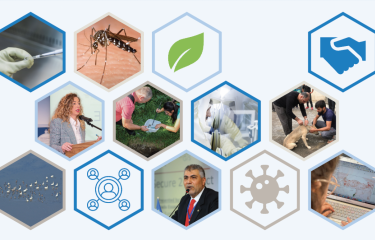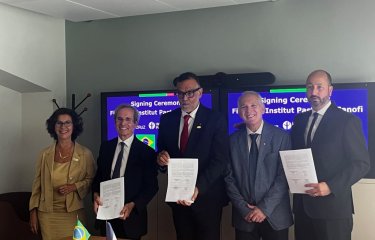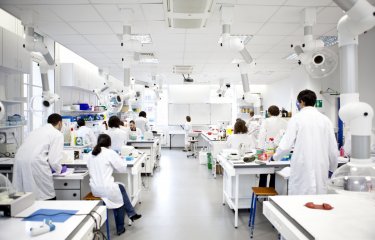Three years ago, the scientific community of the Institut Pasteur International Network (IPIN) expressed its desire to build a comprehensive strategy in order to strengthen its positioning and establish itself as a global public health authority. The Scientific Steering Committee of the Institut Pasteur International Network(COS-RIIP) was created in August 2019 to help achieve this goal. Its 8 members, chosen from the IPIN research community and the international scientific community, held their first face-to-face meeting on February 17-18, 2020.
The COS-RIIP analyzes partnership opportunities between the members of the network, identifies priorities for action and recommends methods of implementation. The brainstorming among its scientists and health professionals confirmed the four priority strategic axes established by the Institut Pasteur and its network in 2017:
- Exploring main endemic or emerging zoonotic diseases using a One Health approach.
- Studying vector-borne infectious diseases.
- Exploring the risks of infection during early years of life, particularly in marginalized and migrant populations.
- Studying the impact of aging / longevity on health.
“With its 32 institutes scattered across 25 different countries, the network is a unique entity within the international public health sphere. Its global distribution and its access to a very wide diversity - geo-climatic, ecosystemic, socio-economic, cultural and biological (human and animal) - could prove decisive in facing today’s health major challenges”. – Pr Koussay, Dellagi, coordinator for the scientific strategy of the IPIN.
At its last meeting, the COS-RIIP reaffirmed the priority of these subjects. It also confirmed the need to monitor the implementation of strategic actions such as exchanges of researchers, allocation of doctoral scholarships, strengthening of transversal research programs and the creation of joint research units between institutes of the Network. Amongst these actions, education was considered as one of the main tools to consolidate the network cooperative aspect; the launch of the "Pasteur International Courses" label is intended to reflect its excellence. These intensive training courses will ensure that knowledge and data are shared between researchers in the network across the continents.
While the world is facing an exceptional health crisis with COVID-19 pandemic, the role of the network is incontestable thanks to the mobilization of partners rooted in local landscapes, some for more than a century, who are sharing a long tradition of exchange. In this context, the COS-RIIP has been given a structuring role: the evaluation of the IPIN research projects submitted to the call for projects launched by the Institut Pasteur task force on COVID-19. To date, thirty collaborative projects have been evaluated. This enabled the attribution of €1.3 million to support important projects such as the exploration of the clinical, biological and epidemiological diversity of COVID-19, with regards to Africa particularly, “One Health” surveys on the virus potential reservoirs, the development of diagnostic tools and the search for anti-viral molecules and vaccines.
The reflection on a systemic strategy for the Pasteur network, supported by the committee, will continue this year and in the future, in order to remain responsive to new public health issues, on a global scale.
|
The Scientific Steering committee of the Institut Pasteur International Networl (COS-RIIP) is composed of eight members: Dr Anna-Bella Failloux (Institut Pasteur, Paris, France), Entomology, Chairwoman of the COS-RIIP Dr Dominique Rousset (Institut Pasteur de la Guyane; Cayenne; French Guyana), Virology ; rapporteur Prof. Mohamed-Ridha Barbouche (Institut Pasteur de Tunis, Tunisia ), Immunology Prof. Daniel A. Boakye (Noguchi Memorial Institute for Medical Research, Accra, Ghana); Parasitology Prof. Benoit Deprez (Institut Pasteur de Lille, France), Chemistry, Drug discovery Prof. Peter Horby (University of Oxford, UK ), Emerging Infectious diseases Dr Hein Min Tun (Institut Pasteur/ Hong Kong University, Hong Kong ), Microbiology Dr François Xavier Weill (Institut Pasteur; Paris, France ), Microbiology
|





